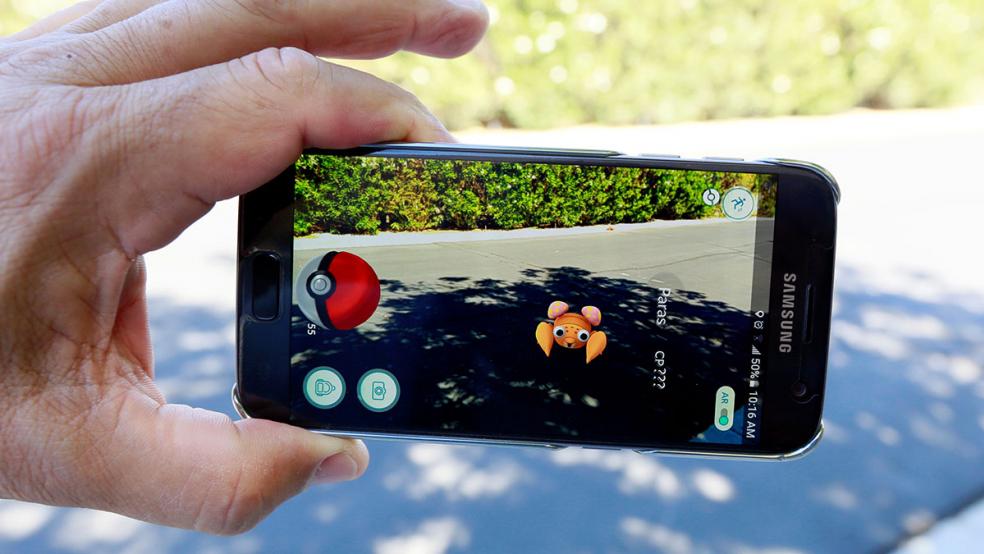Pokémon Go has skyrocketed in popularity since the app hit Apple’s and Google’s stores on Wednesday. By Friday, more than 5 percent of Android users had installed the app, and by Monday morning, its number of daily active users had nearly surpassed Twitter’s.
With the average player spending 43 minutes and 23 seconds a day on the app, the game has a higher usage time than WhatsApp, Instagram, Snapchat and Facebook Messenger. Nintendo’s market value has already surged by $9 billion.
Related: Video Game Changers — 21 Titles That Rocked the Industry
Pokémon Go uses augmented reality — a technology that combines virtual reality and the real world, in this case by using your phone’s camera. The goal of all those hordes of people clustering in seemingly random locations is to catch as many Pokémon, or pocket monsters, as possible and then have them battle at select locations called “gyms.”
To catch the critters, you have to move in the real world. The game tracks your phone’s GPS coordinates as you look for creatures, and once you are within sight of a Pokémon, your phone’s camera will allow you to catch it.
From New Yorkers in Central Park to an American veteran fighting ISIS in Teleskuf, Iraq, Pokémon Go has quickly become a full-blown tech phenomenon, catapulting augmented reality into day-to-day life. Or maybe it’s just the latest viral fad.
Either way, the app has had some surprising and far-reaching consequences:
A potential boost for some businesses: Although the app still has plenty of glitches to work out, it offers a new way for businesses to attract potential customers. If its location is a Pokéstop, the business will be able to draw people in to buy its products and any player can buy a lure module for $10 to attract Pokémon to his general area for a day. It’s a bargain for owners of restaurants, bars and stores, who could have more potential customers wandering around their establishments. Some Brooklyn, New York bars have already organized a Pokémon bar crawl.
Related: What if Apple Made iPhones in the US? Here’s How Much You’d Pay
More people getting out, and getting some exercise: Although you can pay your real life money to lure objects to you, the game itself encourages walking. Already, players are discovering parts of their neighborhood that they never knew existed. There are still a few bugs, though, like the Massachusetts man who discovered that his house had been made into one of the app’s gyms.
Augmented reality augments your social life: As they play, people are meeting each other at parks and landmarks and trading advice on the game. Friendships are budding from common hobbies, and players are arranging meet-ups to go catch Pokémon together. The game has even helped some players’ dating lives.
A tool for criminals — or maybe the discovery of crimes: The outdoor aspect of the game had some downside. On Sunday, the Missouri police department arrested four suspects who had taken advantage of the game to lure distracted players to an isolated location. The suspects, charged with armed robbery, seem to have added beacons to a secluded Pokéstop (place to collect supplies) in the game in order to lure players who they would then rob.
Related: Could Video Games in Schools Power Up Learning?
On Friday, a Wyoming woman walking to catch a water Pokémon instead discovered a man’s dead body lying facedown in her neighborhood river. The police of Fremont County, Wyoming are conducting an autopsy to determine the identity of the man and cause of his death.
The app itself can also be dangerously distracting: Pokémon hunters have reported various bumps and bruises as a result of staring at their phones while chasing the virtual monsters. As a result, the Portland Oregonian suggests that you sit down as soon as you spot a creature. If it’s too distracting, the augmented reality feature can be turned off and changed to a default grass background.
It can be a security risk in other ways, too: The app requests a long list of permissions before you can play. Not only can it track your movement through your phone’s GPS location, but Niantic, the maker of the game, can get full access to a user’s Google account and everything in it — like emails, photos, Drive documents and search history. Malware may also be a threat.




